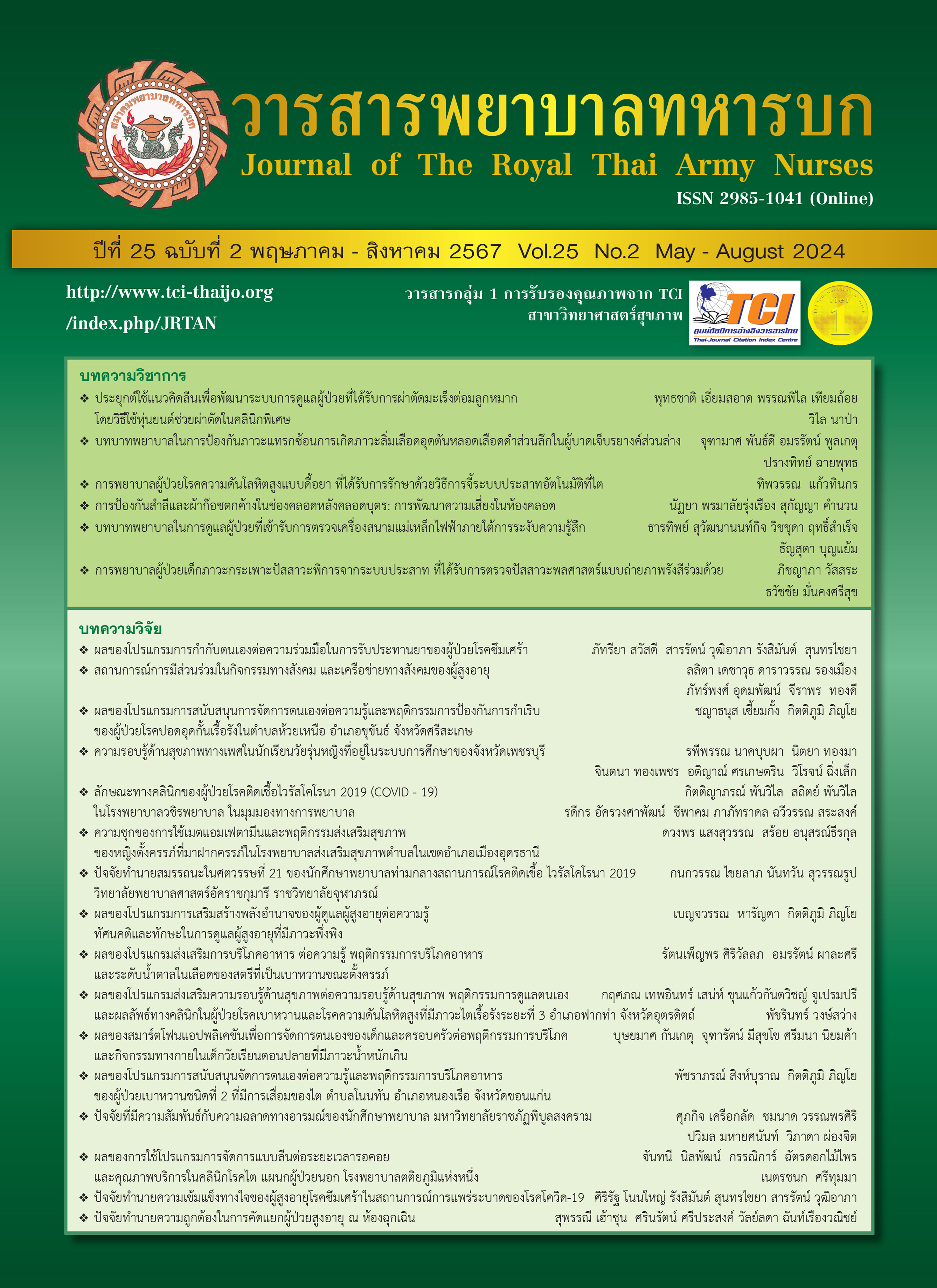Quality of Life Level and Factors Associated with Quality of Life in Healthcare Personnel in Nopparat Rajathanee Hospital
Keywords:
Healthcare Personnel, Quality of Life, StressAbstract
This research is a descriptive cross-sectional study aimed to investigate level of quality of life of medical personnel and factors related to the quality of life of medical personnel. The samples obtained from stratified sampling were 423 healthcare personnel who worked in Nopparat Rajathanee hospital. Quality of life was assessed by WHOQOL– BREF–THAI version and associated factors were assess by ST-5 questionaire. Categorical variables were presented as percentages and frequencies. Those associated factors to quality of life were analyzed using the Chi-square test, then the relationship was found using multiple logistic regression analysis. The statistical significance was p-value<.05
The results of the study found that medical personnel in Nopparat Rajathanee hospital have an overall quality of life at a moderate level. The mean quality of life score was 77.8 points, with a standard deviation of 15.3 points. From the study, 20.1 percent of medical personnel had poor quality of life. Personal factors that were associated with poor quality of life included gender (ORadj = 3.59; 95% CI: 1.04-12.33), history of alcohol use (ORadj = 3.76; 95% CI: 1.49-9.53), economic status (ORadj = 13.5; 95% CI: 5.59-32.54) and stress level (ORadj = 7.90; 95% CI: 3.28-19.05), while work factors that were related to poor quality of life included monthly income level (ORadj = 3.03; 95% CI: 1.05-8.79) and employment type (ORadj = 3.39; 95% CI: 1.29-8.90)
The research findings have led to the development of recommendations that are believed to be able to improve the quality of life of medical personnel. These recommendations include, for example, campaigns to reduce alcohol consumption among personnel and the adjustment of job positions and compensation to reflect the value of their work.
Downloads
References
Office of the National Economic and Social Development Council. The Twelfth National Economic and Social Development Plan. Bangkok; 2017. (in Thai)
Santitham W. Thailand’s doctor shortage problem. Research Article Review of National Assembly Library of Thailand. 2023;38(1):1-17
Asawarungruang W. Factors influencing intention to quit of physician from healthcare facility in Bangkok. (thesis). Bangkok: University of the Thai Chamber of Commerce; 2018. (in Thai)
Luengamornlert S. The role of nurses in the post-COVID era. Bangkok, Thailand: Thailand Nursing and Midwifery Council; 2022. (in Thai)
Liang Y, Wang H, Tao X. Quality of life of young clinical doctors in public hospitals in China’s developed cities as measured by the Nottingham Health Profile. International Journal for Equity in Health. 2015;14(2):85-96.
Kampeera W. Quality of life among physicians in rural hospital, Songkhla province.(thesis). Songkla: Prince of Songkla University; 2018. (in Thai)
Pechnil R. Factors affecting quality of life of public health personnel in during pandemic of coronavirus disease 2019 in Chumphon province. Journal of environmental and community health. 2022;7(1):259-68. (in Thai)
Jung G & Oh J. Factors Affecting Health-Related Quality of Life among Healthcare Workers during COVID-19: A Cross-Sectional Study. Medicina (Kaunas). 2022;59(1):38-49.
Chumporn C & Kensila U, Tungchaidee N, Kongsomboon K. Factors Influencing the Quality of Life of Nursing Department Personnel at Her Royal Highness Princess Maha Chakri Sirindhorn Medical Center Nakhonnayok Province. (thesis). Nakhonnayok : Srinakharinwirot University; 2018. (In Thai)
Khunsri Y, Aujirapongpan S, Ritkaew S, Ru-zhe J. Quality of Life and Social Responsibility of Medical Personnel during the Epidemic of the COVID-19 Virus (COVID-19) Crisis in the Southern Region of Thailand. The Journal of Development Administration Research 2022; 2(1):323-37. (in Thai)
Woon LS, Mansor NS, Mohamad MA, Teoh SH, Leong Bin Abdullah MFI. Quality of Life and Its Predictive Factors Among Healthcare Workers After the End of a Movement Lockdown: The Salient Roles of COVID-19 Stressors, Psychological Experience, and Social Support. Front Psychol. 2021;12(1):623-52.
Rahman MA, Sagar SK, Dalal K, Basha SY, Ara T, Khan MA, Saha S. et al. Quality of life among health care workers with and without prior COVID-19 infection in Bangladesh. BioMed Central Health Services Research. 2022; 22(1):823-34.
Saenrueang T, Junnual N, Sangwalee W. Factors associated with quality of life among medical students at College of Medicine and Public Health, Ubon Ratchathani University. Journal of Medicine and Public Health, Ubon Ratchathani University. 2022;5(1):44-51.
Wittenberg E, Labutte C, Thornburg B, Gebreselassie A, Barbosa C, Bray JW. Alcohol consumption and health-related quality of life in the US during the COVID-19 pandemic: a US national survey. The Journal of Patient Reported Outcomes. 2022;6(1):106-14.
Biostatistics: A Foundation for Analysis in the Health Sciences. 7th edn. Wayne W. Daniel, Wiley, 1999. 16.Silpakij A. ST-5, Stress test questionnaire. Journal of mental health of Thailand. 2008; 16(3): 177-85 (in Thai)
Mahatnirunkul S, Tantip W, Pumpaisalchai W,Wongsuwan K,Prommanajirangkul W. Comparison of the WHOQOL-100 and the WHOQOL-BREF. Journal of Mental Health Thailand. 1998;5(1):4-15. (in Thai)
Ryu S & Fan L. The Relationship Between Financial Worries and Psychological Distress Among U.S. Adults. Journal of Family and Economic Issues. 2023;44(1):16-33.
Department of Mental Health. Stress and Mental Health of Thais. Department of Mental Health Ministry of Public Health; 2014. (in Thai)
Downloads
Published
How to Cite
Issue
Section
License
Copyright (c) 2024 Journal of The Royal Thai Army Nurses

This work is licensed under a Creative Commons Attribution-NonCommercial-NoDerivatives 4.0 International License.
บทความหรือข้อคิดเห็นใดใดที่ปรากฏในวารสารพยาบาลทหารบกเป็นวรรณกรรมของผู้เขียน ซึ่งบรรณาธิการหรือสมาคมพยาบาลทหารบก ไม่จำเป็นต้องเห็นด้วย
บทความที่ได้รับการตีพิมพ์เป็นลิขสิทธิ์ของวารสารพยาบาลทหารบก
The ideas and opinions expressed in the Journal of The Royal Thai Army Nurses are those of the authors and not necessarily those
of the editor or Royal Thai Army Nurses Association.






